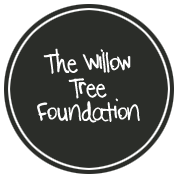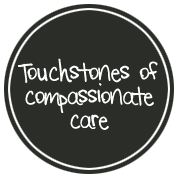Daily Living With Distress and Enrichment
This weekend, I was looking through some of the papers and articles I’ve accumulated over the last eleven years. I came across an article that I shared on the Tracheostomy.com message board back before I started blogging. I think it is worth sharing again with those of you who follow my blog who also "live the life" or who are close to those of us who do.
The article discusses the results of a study of families of children who are supported by a ventilator or positive-pressure device at home. The results were not surprising and, from my perspective, were spot on. I also think much of what this study revealed is true for parents of any medically fragile or chronically ill child, not just parents of children who are ventilator dependent.
The study explored the moral dimension of family experience through detailed accounts of life with a ventilator dependent child and examined the moral phenomena inherent in (1) the individual experiences of the ventilator-assisted child, siblings and parents and (2) the everyday family life as a whole.
The study identified six principal themes:
1. Confronting parental responsibility: parental responsibility was described as stressful and sometimes overwhelming. Parents needed to devote extraordinary care and attention to their children’s needs. They struggled with the significant emotional strain, physical and psychological dependence of the child, impact on family relationships, living with the daily threat of death, and feeling that there was “no free choice” in the matter: they could not have chosen to let their child die.
2. Seeking normality: all of the families devoted significant efforts toward normalizing their experiences. They created common routines so that their lives could resemble those of “normal” families. These efforts seemed motivated by a fundamental striving for a stable family and home life. This “striving for stability” was sometimes undermined by limitations in family finances, family cohesion and unpredictability of the child’s condition.
3. Conflicting social values: families were offended by the reactions that they faced in their everyday community. They believe that the child’s life is devalued, frequently referred to as a life not worth maintaining. They felt like strangers in their own communities, sometimes needing to seclude themselves within their homes.
4. Living in isolation: families reported a deep sense of isolation. In light of the complex medical needs of these children, neither the extended families nor the medical system could support the families’ respite needs.
5. What about the voice of the child? The children in this study (patients and siblings) were generally silent when asked to talk about their experience. Some children described their ventilators as good things. They helped them breathe and feel better. Some siblings expressed resentment toward the increased attention that their ventilated sibling was receiving.
6. Questioning the moral order: most families questioned the “moral order” of their lives. They contemplated how “good things” and “bad things” are determined in their world. Parents described their life as a very unfair situation, yet there was nothing they could do about it. Finally, an overarching phenomenon that best characterizes these families’ experiences was identified: daily living with distress and enrichment. Virtually every aspect of the lives of these families was highly complicated and frequently overwhelming. An immediate interpretation of these findings is that families should be fully informed of the demands and hardships that would await them, encouraging parents perhaps to decide otherwise. This would be but a partial reading of the findings, because despite the enormous difficulties described by these families, they also reported deep enrichments and rewarding experiences that they could not imagine living without. Life with a child who requires assisted ventilation at home involves living every day with a complex tension between the distresses and the enrichments that arise out of this experience. This irreconcilability is particularly stressful for these families. Having their child permanently institutionalized or disconnected from ventilation (and life) would eliminate both the distresses and the enrichments. These options are outside of the realm of what these families could live with.
1. Confronting parental responsibility: parental responsibility was described as stressful and sometimes overwhelming. Parents needed to devote extraordinary care and attention to their children’s needs. They struggled with the significant emotional strain, physical and psychological dependence of the child, impact on family relationships, living with the daily threat of death, and feeling that there was “no free choice” in the matter: they could not have chosen to let their child die.
2. Seeking normality: all of the families devoted significant efforts toward normalizing their experiences. They created common routines so that their lives could resemble those of “normal” families. These efforts seemed motivated by a fundamental striving for a stable family and home life. This “striving for stability” was sometimes undermined by limitations in family finances, family cohesion and unpredictability of the child’s condition.
3. Conflicting social values: families were offended by the reactions that they faced in their everyday community. They believe that the child’s life is devalued, frequently referred to as a life not worth maintaining. They felt like strangers in their own communities, sometimes needing to seclude themselves within their homes.
4. Living in isolation: families reported a deep sense of isolation. In light of the complex medical needs of these children, neither the extended families nor the medical system could support the families’ respite needs.
5. What about the voice of the child? The children in this study (patients and siblings) were generally silent when asked to talk about their experience. Some children described their ventilators as good things. They helped them breathe and feel better. Some siblings expressed resentment toward the increased attention that their ventilated sibling was receiving.
6. Questioning the moral order: most families questioned the “moral order” of their lives. They contemplated how “good things” and “bad things” are determined in their world. Parents described their life as a very unfair situation, yet there was nothing they could do about it. Finally, an overarching phenomenon that best characterizes these families’ experiences was identified: daily living with distress and enrichment. Virtually every aspect of the lives of these families was highly complicated and frequently overwhelming. An immediate interpretation of these findings is that families should be fully informed of the demands and hardships that would await them, encouraging parents perhaps to decide otherwise. This would be but a partial reading of the findings, because despite the enormous difficulties described by these families, they also reported deep enrichments and rewarding experiences that they could not imagine living without. Life with a child who requires assisted ventilation at home involves living every day with a complex tension between the distresses and the enrichments that arise out of this experience. This irreconcilability is particularly stressful for these families. Having their child permanently institutionalized or disconnected from ventilation (and life) would eliminate both the distresses and the enrichments. These options are outside of the realm of what these families could live with.
****************
I found it very interesting to read that a lot of the stress we feel in our daily life is attributable to the inability to reconcile the tension between the distresses and the enrichments that arise out of this experience. It makes a lot of sense, but I never really thought about it that way until I read the article. I don't know that we can ever truly reconcile the hardships and the joys of this experience. For "survival" purposes we have to try and keep focused on the enrichments our child brings into our life (and there are many). But, it's also important to recognize and accept (without guilt) that somedays we won't be able to think past how tired, sad and lonely we are and that is okay too. It's a delicate balance (and utterly exhausting) to find a place of inner peace given our daily struggle to reconcile the distresses and enrichments of this life.
The article discussing this study was published in the January 2006 issue of Pediatrics (the official journal of the American Academy of Pediatrics). If anyone wants a copy of the article email me and I'll send it to you. I have it saved on my computer at work, so just know if you want a copy it will be coming from my work email.









7 comments:
I remember reading this before Ann and thinking 'how true' It's still the same today, even though Sam doesn't have the trach anymore, there's still the learning difficulty, lack of speech, feeding tube and all the other medical stuff that we deal with on a day to day basis.Thank you for sharing this again xx
It is a good article. As Julie said, even with the trach gone, we still have ongoing issues--twice weekly speech sessions that impact our ability to be at work, frequent illness, insurance headaches, emerging phsychological issues in the child, etc...We have been out to dinner by ourselves only 1 time since decannulation in May! I wish I had the answers...
Kristy
Although Max has many, many medical issues he is not vented, however the list you provided in your post all apply to our daily lives. It really does suck!
I can beat the one dinner out since May...we went out for the first time sans kids in 8 1/2 years just a couple of weeks back. We may hold the record or at least I hope so for other families :)!
My favorite article ever!! Confirmation I'm NOT CRAZY!! :)
I think I read it on the trach board when you posted. It is surprizing at how much it is our life. It's almost something you want to hand out to ever doctor, or person you meet so they may understand where you are coming from. Could you please send me a copy. I would like to send it to my nephew. Thanks for the post.
Thank you for posting this Ann. It's hard enough with "just" the trach and other medical issues. I have never doubted that having a child on a ventilator must be especially hard. Still, I can relate to much of what this article says.
We had to describe the life for an attorney. I said basically "it is what it is" and the attorney understood what I meant, but didn't like that for his purpose. He needed us to explain why it is hard. I think this article does a great job of that. Thanks for posting it.
Post a Comment